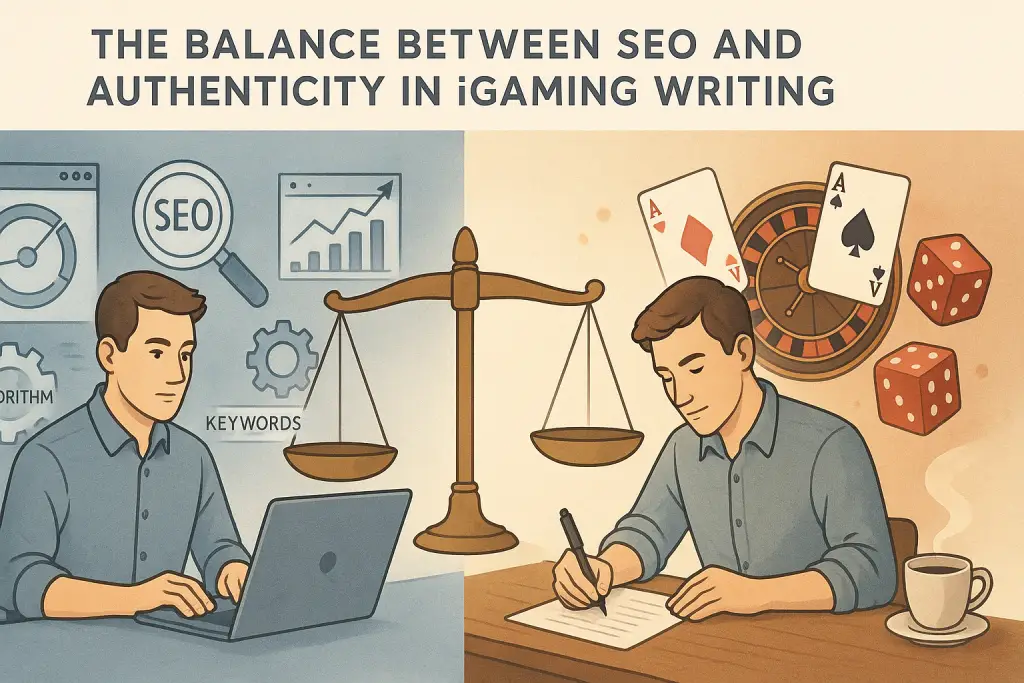Combining SEO and authenticity in iGaming writing isn’t a picnic. For less-experienced writers, it may seem as though this is a minefield that you’ll never pass. It doesn’t have to be, though. Even old hands and experienced writers must continually evolve their skills to adapt to changes in the iGaming space. In recent years, there has been a shift from SEO to more authentic, experience-driven articles, but neither is solely the answer to producing good content.
Finding a way to incorporate SEO content while still sounding authentic is a puzzle, but it’s critical nowadays. Discovering a balance leads to improved rankings, but it also fosters a genuine connection between you and your audience. Both will lead to sustained growth for your business. In this article, I’ll unlock and reveal the secret.
Why SEO Is Imperative in iGaming Writing
Twenty years ago, Search Engine Optimisation wasn’t really a thing. Ten years ago, it was the most important aspect of an article. However, as readers grew tired of spammy, repetitive articles, SEO was forced to take a back seat. Readers and search engines alike (especially those training AI on our content) wanted authentic, experience-driven articles. SEO is still important, though. It drives search visibility and helps your content rank and draw in traffic.
Good SEO practices are about more than keyword stuffing. They also involve keyword localisation to help you target specific sectors and audiences, while compliance considerations will help your articles avoid gambling advertisement blocks. The latter has become significantly important of late, as national licensing and regulatory bodies try to shut out content that encourages irresponsible gambling. For an article to land, you need to tone down your SEO and make it more concise for tailored markets.
An Authentic Voice is Equally Important
Reader fatigue is very much a real thing. Nobody wants to read an endless array of generic, overproduced and oversaturated content. Establishing trust with your readers is important. They want to read content from an authoritative source that knows their onions, goes on the same journey as players and relays authentic opinions that are true to the experience your readers will have.
Being authentic and genuine and using your experience means you can afford to be critical and yet fair. This helps convince readers to revisit your site and generate traffic, setting your business apart from counterparts who are set in their ways when it comes to content. Readers will flock to your site if it is packed with unique content, fresh with original ideas and less (but more structured and concise) SEO.
Finding the Balance Between the Two
While it is hard to see at first (it took me over a year to finally get the balance right), it is possible to blend and balance the two concepts to produce SEO-optimised but original, authentic content. Below, I’ll share with you four top tips that have worked well for me when balancing SEO and authenticity. It’s the kind of advice I wish I’d been given when I first set out to improve the quality of my work:
- Natural keyword integration is critically important. Once I’ve formulated a template and outline, I insert the keywords I want to use before writing any body text. This way, I can structure paragraphs and sentences around those keywords. They all fit naturally because I’ve chosen specific keywords for the various topics I want to cover in each piece. If you choose to insert keywords after writing your article, you’ll be forced to alter vast sums of perfectly authentic and readable text, watering down its uniqueness.
- Never use all the keywords recommended to you. Skip any and all keywords that simply aren’t relevant to the topic you’re covering and those that are spammy. For instance, if an article is a casino review, using a “free spin bonus” keyword will work, but it’s not the best fit. Keywords related to “sports betting” certainly shouldn’t be used unless the site has a sportsbook. Another example is the overused keyword “no-deposit bonus”. No-deposit bonuses are popular with readers, so writers will try to cram the keyword in anywhere they can, even when the casino they are reviewing doesn’t have such an offer. This is a no-no.
- Try experimenting with focus keywords and trailing keywords. These can often mask and hide key implementation. For instance, instead of spamming “casino bonus”, “slot bonuses”, “new players”, or “casino promotion”, try using “casino slot bonuses and promotions for new players”. Longer, trailing keywords are easier to use naturally, easier to read, and don’t appear spammy. Remember, you don’t have to stick to the keywords exactly – this is a rookie mistake. Using definite articles, conjunctions, and prepositions between keywords is perfectly fine.
- When it comes to being authentic and using keywords, there is a trick I like to use. Let’s say that you want to use the keyword “casino license”, but the casino you’re reviewing doesn’t have one. Inexperienced writers will simply write that “there is a casino license” to incorporate the keyword. This is a lie; your readers will notice that you’re yanking their chain, and they won’t be happy about being duped. Instead, you can be authentic, earn their trust and still use the required keyword. I’d tackle this problem with honesty by simply writing, “We couldn’t find a casino license associated with this site”. You can see the results for yourself. I used the same keyword but in a truthful, honest and authentic way.
Implementing Strategies to Balance SEO and Authenticity
Next, I’ll provide you with a final bit of advice on the various aspects of putting what you’ve learned into an effective strategy, with some dos and don’ts.
Balancing SEO and Authenticity Is a Three-Task Process
It’s relatively straightforward to practice balancing SEO and authenticity if you’re working alone. It’s a far more gargantuan task if you don’t. If you run a team, I strongly recommend teaching them the basics – never assume that they’ll simply figure out how to learn this skill. Managing and balancing SEO and authenticity involves three tasks – teaching your writers how SEO works, allowing them to gain experience and use that to produce authentic pieces, and finally, merging the two concepts together to produce quality content. Don’t rush the process.
Keyword Stuffing Is A No-No, and AI Doesn’t Have Experience
If you’re showing new writers the ropes, it’s also important to highlight how counterproductive fluff and keyword filler content are to authentic articles. Keyword-stuffed content and simply churning out boring, generic sentences with no facts or authoritative opinion behind them are surefire ways to see articles torpedoed. The same is true of AI-produced content or those edited automatically. Simply writing in first-person doesn’t showcase authority and isn’t enough if you don’t share your personal opinions on the topic at hand, something AI can’t do with any real accuracy.
Your Experience and Reading Aloud
Being truthful and authentic in reviews requires nothing more than experience. The more articles you write, the more games you play, the better your knowledge will be to compare and contrast sites and games with one another to produce accurate, honest content. Similarly, taking basic steps like reading your content aloud can help with SEO. For instance, you’ll soon hear how many times keywords crop up in sentences. If you find the same keywords emerging several times in a paragraph, go back and edit it before reading the rest of the piece.
A Word on SEO Editing Software
It may be tempting to pay for optimisation editors. There are lots of these online with varying costs, and they are cheaper than hiring someone to show you the ropes initially, but not in the long run. SEO editors can provide you with lists of researched keywords, and they’ll remind you how many times you’ve used keywords and give you a “good score” based on the keywords you’ve used. However, they’ll also try to cram in as many of those keywords as possible. Nine out of ten times, you’ll end up with overly spammy content. Moreover, these editors can’t help you one bit with authenticity or authority. The human touch is better, so I recommend that you own your work and take a vested interest in sharpening it using the new skills you’ve learned instead.
The Final Word
By understanding that it is your experience that readers want to hear, but also factoring in SEO so your content ranks, you’ll end up producing the best sorts of articles – articles that rank and win you a crowd.

